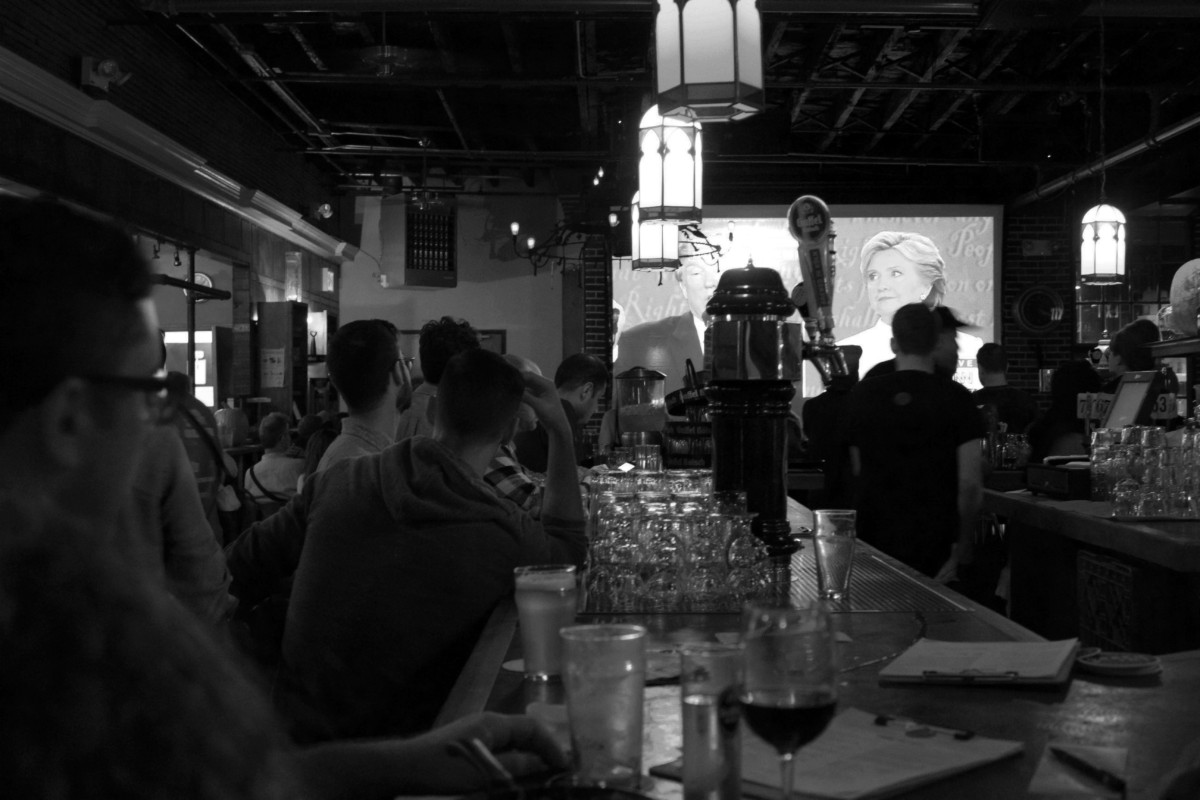New York is hardly a serene city, and it its citizens are rarely relaxed about presidential elections in any year. But this one is taking some of us over the top.
Just last week, the Brian Lehrer Show on WNYC spoke with therapists from the New York area who have tackled politics in sessions this election cycle. The effects of this election are reaching beyond personal distress and seeping into relationships as well.
The depth of feelings was apparent at Greenpoint Beer and Ale in Brooklyn, where people gathered to watch the final debate. Watching the debate in the beer hall had been publicized as a neutral viewing party, but there didn’t appear to be a single Trump supporter in the house. “Everyone here is voting for Hillary, and it’s pretty obvious why,” said Helena Haimes, a Londoner who has been living in Brooklyn for about a year.

Haimes’ matter-of-fact statement was echoed in the cheers and applause that followed key moments in the debate, like when Hillary Clinton called Donald Trump “the most dangerous person to run for president in the modern history of America,” or the groans that erupted when Trump turned the conversation back to Clinton’s emails after labeling accusations of sexual assault against himself as “fiction.”
Joshua Pare was sympathetic to the Trump base, though. “I understand the frustration with middle America,” he said, “and everybody is frustrated with the media’s portrayal of both sides, politically.” He went on to say that he feels this election is more about social issues than economic ones.
One reason for the high anxiety in 2016 may be that some of the campaign rhetoric has been targeting specific groups. As one psychotherapist who practices in New York City, but who asked to remain anonymous to protect his patients’ privacy, explains, “Trump has led to increases in the feelings of shame, pain, fear, anxiety, and hopelessness in my patients, especially in those groups who have felt attacked by his message, i.e. women, people of color, Muslims, immigrants, the LGBT community, and the disabled.”
And then there are the tensions within families. “Absolutely none,” was Rob Schlayer’s response when asked if he has had political discussions with family members this year. Schlayer, who is originally from San Diego and said his family has a strong military background, has avoided controversial topics during this election cycle, especially with his father, citing “residual hatred” on behalf of some family members regarding Bill Clinton’s efforts to downsize the military in the 1990s.
Romy Cenerizio, a 24-year-old who has lived in Brooklyn for two years, said that this is the first election during which she’s felt she has really been able to form her own opinions. “My whole family is very strongly divided,” Cenerizio said. She explained that she is from an area of New England where the environment seems more homogenous than here in the city, and where it can be easy for some people, like her parents, to overlook issues like homelessness and income inequality that they don’t see much of. Cenerizio said that since moving to the city, she witnesses racism, sexism, and other kinds of harassment more regularly, and it’s easier for her to be empathetic about such issues.
Cenerizio describes both of her parents as reactionaries. Her father, she says, blames hostile race relations on how “the media” portrays the topic, and her mother, who is foreign-born, “has experience with socialism,” which pushes against bringing any kind of socialist ideals into practice here, but also the traditional democratic foundation that is the reason so many people come to the United States.
Regardless of political affiliation, the psychotherapist from New York City said, “The anxiety is visceral. I don’t think it’s a life or death situation, but people think it’s a life or death situation, on both sides.”
As someone who has been practicing for 17 years—and the past five elections—he said this year is the first time he has heard so many of his patients bring up politics. And as for tensions among disagreeing family members, the therapist said, “Trump will come and go but those underlying dynamics will still be there.”


Leave a Reply